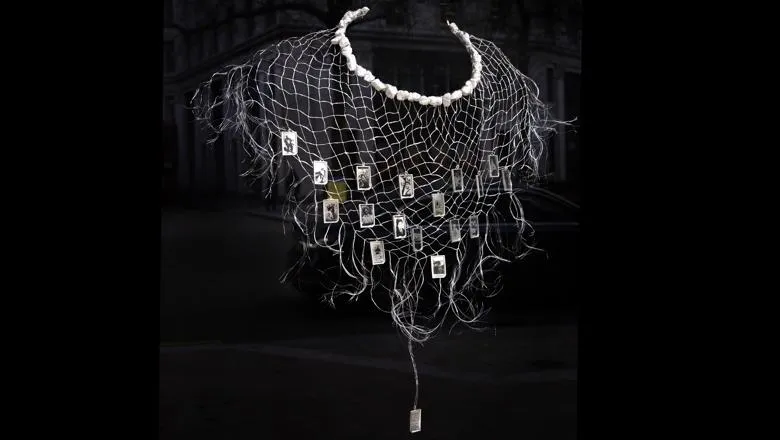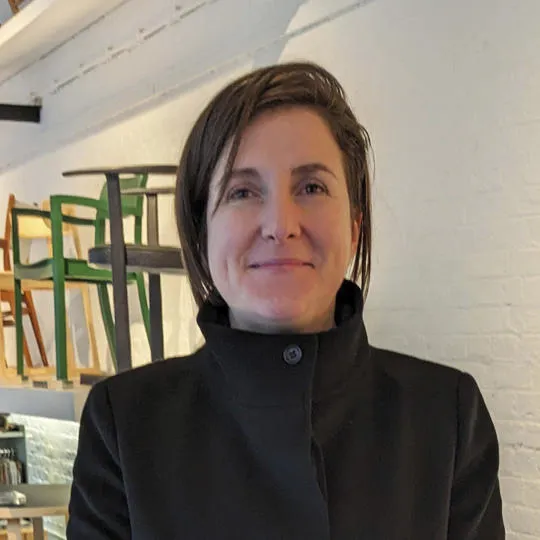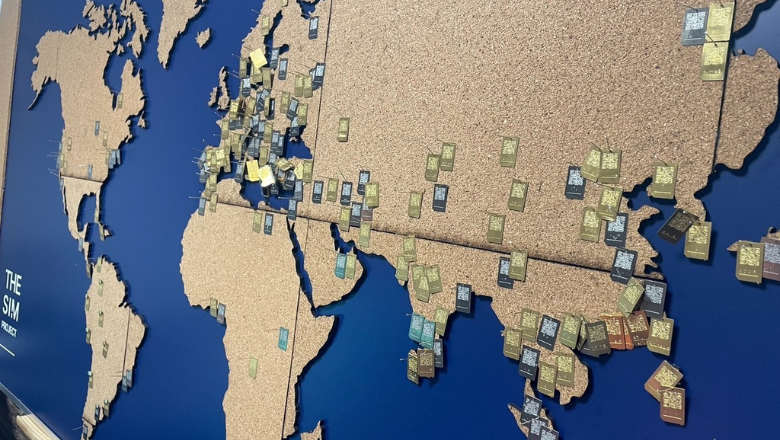Shown for the first time, a bespoke jewellery piece in Waymarkers depicts the strength of community care and friendship.
Waymarkers, a new, free exhibition from artist and anthropologist Liz Hingley, has now opened in The Curiosity Cabinet at 171 The Strand. The works inside, created from thousands of personal images printed onto SIM-scale glass as part of the multi-year SIM Project, include a collective mosaic, a slideshow projection and an elaborate jewellery piece, shown for the first time as part of this display.
This stunning new piece was inspired by The Portland Global Friendship Group, formed in response to fear and hostility surrounding the arrival of the Bibby Stockholm barge - designated temporary accommodation for hundreds of men within the asylum system. The group’s mission was simple: to welcome the men to the island and keep Portland kind.
The act of making and sharing stories brought the group, consisting of both residents of the Bibby Stockholm barge and those who already lived in Portland, together. In intimate workshops, mobile phone photographs were selected by group members capturing shared moments—activities, views, hugs and laughter—then printed onto glass models, framed and knotted together with silver thread around a central core made of Portland limestone fragments collected by group members.
As part of Waymarkers, 30 silver framed sim pendants from the group now hang together from its net-like structure, reflecting suitcases collected by locals to ensure the men could carry their belongings with dignity as they left the barge for accommodations across the UK.
On display for the first time in The Curiosity Cabinet, this piece depicts the strength of community care and friendship. Exhibited alongside quotes from the group, it is visible from the street on the corner of the Strand.
“Out of adversity, a really beautiful thing grew. We have become a better community because of the men.”
Laney, founder of the Portland Global Friendship Group
An illuminated mosaic made from thousands of SIM artworks created by people with roots in over 40 countries also features in Waymarkers. A peep hole in the door provides an enlarged view of individual SIM designs projected on the internal walls of the exhibition space. Participants' words frame the installation alongside hieroglyphs of the project's bespoke camera and miniature darkroom kit.
 SIM card mosaics in The Curiosity Cabinet at 171 The Strand. Photo Jack Latimer.
SIM card mosaics in The Curiosity Cabinet at 171 The Strand. Photo Jack Latimer.Waymarkers will be on display in The Curiosity Cabinet until September 2025, with activities that include Bonds Beyond Borders, and events during London Design Biennale. There will also be a series of workshops with the National Portrait Gallery in dialogue with their miniature painting and tin-type photography collections.
“I hope that Waymarkers offers people a moment of reflection into what gives them meaning in their busy digital lives, and a curiosity to befriend people with different backgrounds, gifts and languages to their own”
Liz Hingley, Artist and Anthropologist
The SIM Project
The SIM Project highlights the smartphone SIM card as a universal symbol of connection and a vital tool for building local and international relationships. Founded by Liz Hingley in 2017, it has evolved over the past eight years, with initiatives that include the King’s College London research project The SIM Project: Illuminating networked belonging in migration, a collaboration between Dr Zeena Feldman (Senior Lecturer in Digital Culture) and Liz Hingley. The project probed the relationship between smartphones, belonging, visual culture and migration.
Lost & Found: Stories of sanctuary and belonging
Waymarkers is supported and produced by King’s Culture. It is part of Lost & Found: Stories of sanctuary and belonging, a free programme of arts and ideas at King’s College London, presented by King's Culture and created with artists, researchers, academics and communities from London and beyond.
Lost & Found explores themes of refuge, resilience, and the search for safety in a world facing significant social, political, and environmental challenges. It reflects King’s status as a University of Sanctuary and has been inspired and informed by King’s life-changing research and commitment to building peace and justice in a turbulent world.
The Curiosity Cabinet
The Curiosity Cabinet is a space created by King's Arts & Humanities, with a programme produced by King’s Culture. It tells the story of some extraordinary research being done by King's staff and students using the physical and digital objects that have inspired or emerged from it.
Partnerships
The SIM Project evolves with the skills and dedication of a team including designer Egemen Kilizcan, photographer Frank Menger, jeweller Sofie Boons, and many others. Thanks to 4JET for their ongoing sponsorship of glass models and to the University of West of England for support.
Together with partners Counterpoints Arts and Kings Culture, the project seeks to nurture understanding and help shift hostile narratives through arts.




